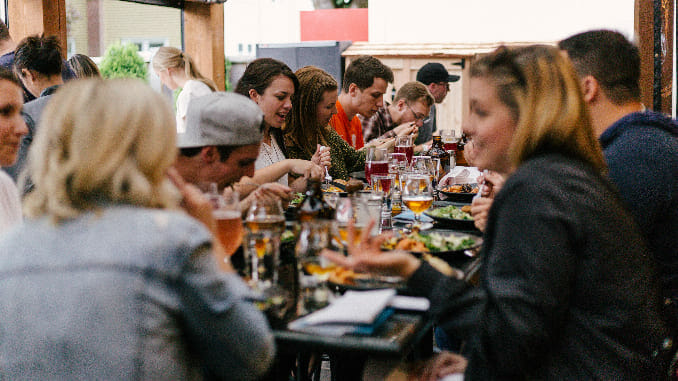Communal Dining: The Joy (and Post-Covid Awkwardness) We Need Right Now
Photo by Priscilla Du Preez/Unsplash Food Features restaurants
Life as a writer has benefits. Occasionally, public relations from a destination or hotel will offer a stay to preview what they have to offer. I’ve had the pleasure of meeting interesting people and seeing incredible places when touring as a member of the press.
On a recent trip like this, I found a solution for some of my blues that I associate with the losses and upheaval from the pandemic. Dining with other guests brought unexpected joy and a feeling of connectedness.
FFF (Forced Family Fun)
Recently, I stayed at a resort in North Carolina that fostered a communal style of dining. The Swag in Waynesville hosted family-style meals with a vibe much like a family gathering or a cocktail party with friends. It turned out to be exactly the push I needed to embrace social interaction after Covid.
During the stay-at-home portion of the pandemic, I’d lost the art of conversation. That typical ebb and flow that’s always been a natural part of my life was more stilted and tiring. I’d spent the last few years avoiding eye contact over a mask, fully exercising the anonymity it provided. I soon realized I’d been craving the connection.
We checked into the hotel around the time of the first meal. A man stepped forward to ring a dinner bell, a leftover tradition from the resort’s first owners. The sound rang out and we lined up to serve ourselves from deep bowls of fresh herbs and vegetables, pastas and beans, and chose between gourmet cuts of barbecue. It was time to sit, so our host led us to a room filled with tables facing and near each other, separate but close enough that conversation between guests was unavoidable. The clever arrangement circled around a large fireplace, the mountain temperatures forcing us to seek its warmth.
Each evening, my husband and I sat down to an innovative menu at assigned tables. It seemed lucky that we had the good fortune to be next to the couple we met earlier in the day, but the hotel staff may have been responsible.
We left this mini-vacation with new acquaintances, but more importantly, the satisfaction of conversation. Descending the narrow road straddling the Great Smoky Mountains State Park, my stomach muscles felt tight from the laughter we’d had by the fireplace talking to a group of couples clustered by the stone hearth. We were different in age, life experience and locations in the United States, but we were all encouraged to communicate by the hotel’s design. The glow of human relations carried over well after we arrived home.
There is psychological proof that family-style dining has benefits that can offset disconnection. In a study by the University of Oxford in 2017, researchers found that when people eat together, they report feelings of happiness and satisfaction. Recently, The Lancet reported that people in locations with higher Covid rates in 2020 experienced increased rates of diagnosed depression and anxiety. Communal dining could be part of the cure.
An Oldie But a Goodie
At Mrs. Wilkes Kitchen in Savannah, Georgia, the family tables have seated opposing politicians, celebrities, locals and tourists. Run by Marcia Thompson, whose self-declared job title is “Mrs. Wilkes’ granddaughter,” and her son Ryon, this restaurant has been the very personification of family-style dining for decades. In 1943, Sema Wilkes opened the restaurant in her boardinghouse, offering steaming plates of Southern comfort food to guests. Now, the lines wrap down the cobblestoned length of Jones Street when it’s time for the lunch seating, hungry patrons waiting on a chance to dine at one of the tables for ten.
During the pandemic, the staff used the courtyard to serve patrons, but Thompson knew it was important to open as soon as it was safe. “We needed to open up because, especially now, people crave that camaraderie,” she said.
When she opened in World War II, Sema Wilkes had the challenge of providing reassurance during a similarly tumultuous time. Thompson keeps her grandmother’s lessons alive by staying true to the original mission of communal comfort.
“My grandmother told me that if we could sit down together and eat food, we might not have to fight all those wars. Nothing is like sharing a meal, it’s a whole other level of connection.”
I Do, With All of You
As the owner of Breck Chefs in Breckenridge, Colorado, Eileen Jacobsen was familiar with serving vacationing tourists family-style as a personal chef. She found her communal dining service moving toward weddings as couples planned smaller destination events after having bigger parties cancelled during the pandemic. With one wedding, the family-style food resulted in a blend of cultures and traditions.
“Last fall, we had a wedding with several different cultures and regions represented: Korean, Midwestern American, Brazilian and French Canadian. The menu included notes of each food style,” she said.
Some of the guests didn’t even have language in common, but the sharing of food at the table worked to bring them together.
“If you think about the term ‘family style,’ it tells you everything you need to know,” Jacobsen explained, “A dinner with family is the epitome of comfort. Everyone knows that feeling and can tap into it even when sitting with complete strangers.”
Bringing your family and friends to a table fosters a feeling of connection. There’s little distraction meeting face to face, and passing a meal offers a respite from busy days and worried times. As we struggle to find our footing in a post-covid world, communal dining can be a powerful tool.